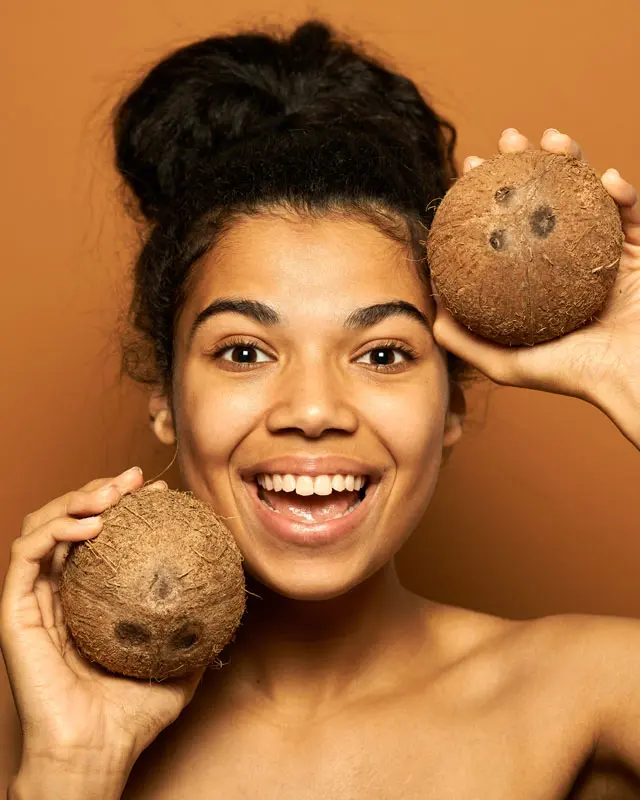Like all vegetable oils, its main virtues come from its fatty acid content. Applied to the skin, these fatty acids nourish, soften, restore the hydrolipidic film and stimulate sebum production.
Coconut oil is everywhere!
Used since forever in the Asian and African countries where it comes from, it has become popular in the kitchens of European homes. It replaces more traditional fats such as butter or olive oil. It has become an interesting alternative popularized at a time when palm oil had a bad reputation.
But its use goes beyond cooking.
This 100% natural ingredient is also on the rise in the cosmetics sector. It is found in the composition of more and more products. You will recognize it by its Latin INCI name: "cocos nucifera oil". Beyond its benefits, it is perhaps its origin, its smell, and its tropical resonance that make it an ingredient particularly appreciated by consumers.
In cosmetics, it is used alone, or combined with other ingredients to create skin care products for the face and body, or for the hair.


The many benefits of coconut oil make it a versatile ingredient, appreciated for formulating all types of beauty treatments. On the face, it is particularly suitable for dry skin. If you have combination or oily skin, use it occasionally on the face so as not to clog the pores, and thus, promote the appearance of pimples or blackheads. Apply it locally, on the driest areas.
Moisturizing facial care: This oil can be used as a moisturizing beauty treatment for the face. Its composition rich in fatty acids helps to nourish and moisturize the skin. It fights against skin aging and the appearance of wrinkles by making the skin more supple and elastic. In addition, its antibacterial effect limits the appearance of pimples. Coconut oil can also be used as a localized moisturizing treatment for chapped lips.
Makeup remover: Use it to remove your makeup. It even removes waterproof mascara! A two-in-one solution: you remove your makeup and nourish your eyelashes.
It can be used in application on the face for people with rather dry skin. However, it is of great interest for everyone, in application on the body and hair.
Interesting properties for use on the body
• Nourishing body oil: The skin on your body also needs to be hydrated. You can apply the oil all over your body, focusing on the driest and most damaged areas. After shaving or hair removal or on your hands, in a nourishing cream or soap. Apply raw coconut oil or combined with another ingredient to multiply the benefits according to your needs. For example, you can combine it with rosehip oil, known for its regenerating properties. Apply this mixture to your thighs, buttocks and stomach to reduce stretch marks and limit their appearance.
• After-sun care: Apply it after exposure to the sun. It will soothe your dehydrated skin.
• Intimate hygiene: Its antibacterial properties are interesting for intimate hygiene. It is recommended to fight against mycoses. Its oily texture allows it to be used as a lubricant, but be careful, the oil is not compatible with condoms.

Hair is often mistreated: wet, dried, then heated, etc. Applying a vegetable oil helps to nourish and repair it. Coconut oil is suitable for all hair types, the drier, curly or frizzy it is, the more often it can be applied. It penetrates the hair fiber and protects the hair by acting as a protective film, which prevents dehydration. Your hair is healthy, shiny and supple.
It can be combined with washing agents to nourish the hair when shampooing. In Ayurvenat solid shampoo, it is combined with several essential oils with purifying and toning properties to beautify and make dull hair shine.
It can be used to facilitate detangling and styling. Apply coconut oil to dry hair in small quantities, only on the ends. It will detangle and nourish the hair at the same time. If you have dry hair, and you are looking for a daily care without rinsing, you should appreciate Oléanat perfumed hair sprays: monoi or mango scent!
For more beautiful, supple and resistant hair, use it as a mask, focusing on the lengths. Leave on for at least 1 hour, then shampoo. Combine it with other vegetable oils (nigella, argan, castor, jojoba, avocado) and vary the ingredients to benefit from various benefits. To see real results, be regular: once a week.
Coconut oil fights against dry skin and hair. The fatty acids it contains have a lipid-replenishing effect. Lauric acid, in particular, has an anti-inflammatory and antibacterial effect. Indeed, coconut, prey to microorganisms that proliferate in tropical climates, has natural antibacterial properties.
The solution for specific hair problems.
• Scalp care: Its nourishing, soothing and antibacterial properties help to care for the scalp and fight against dandruff. If you have a sensitive and rather dry scalp, this oil can help to balance and cleanse it.
• Anti-lice treatment: Coconut oil has an anti-fungal effect: it prevents the proliferation of lice by asphyxiating them. Apply the oil to the entire head of hair and leave on for at least 30 minutes. Repeat the operation 10 days later.
An ingredient sometimes also used in toothpastes
As you will have understood, coconut oil has become an essential ingredient in the cosmetics sector. Its benefits on the skin and hair are recognized and its use is increasingly varied.
Not only does this natural ingredient beautify the skin and hair, but it also has benefits for teeth and gums. It is increasingly found in toothpastes for its whitening, antibacterial and refreshing effect.
Virtues that are also found in Miswak (or Siwak), an ingredient derived from a root and used since Antiquity for oral hygiene. Miswak prevents the appearance of cavities, strengthens the gums, purifies the mouth, freshens breath and erases stains on the enamel thanks to the presence of silica.
This ingredient, which no longer needs to prove itself, is traditionally used in the Middle East, Africa and Asia. Just like coconut oil, it is also 100% natural. Miswak is used in the composition of Ayurvenat toothpaste, a vegan and organic toothpaste, inspired by Ayurvedic medicine.

check_circle
check_circle